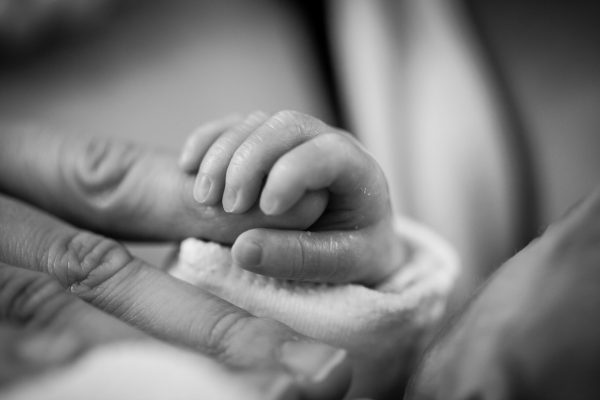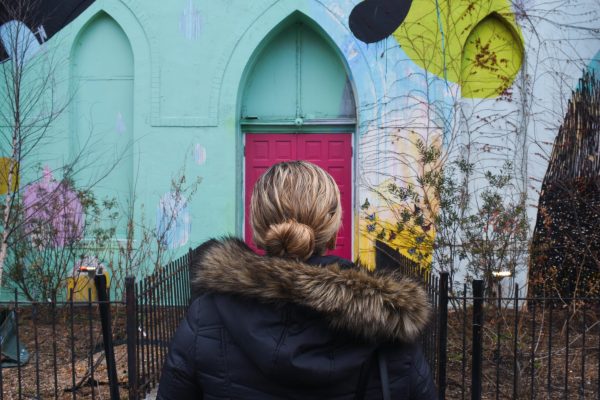For the full text of the article from which this ceremony is taken, click here.
… Although we’ve seen that blood has loosely been introduced as a component of ceremonies welcoming girls, it has not played a central role in any of them. Let us explore a ceremony where lochia, referred to in the Torah as d’mei taharah [ed.: purifying blood], is the core of a Simchat Brit.
Because Brit Milah works so well as a ceremony at so many levels, paralleling the ritual seems both helpful and powerful. Because a mother’s lochia changes from tamei [ed.: impure] to d’mei taharah on the 8th day when a boy is circumcised and on the 15th day when a girl is born (Leviticus 12:3-5), it seems fitting that a Simchat Brit would take place 15 days after the birth of a girl.
Although arguments can be made to the contrary, it seems appropriate that Abraham’s receipt of the brit continue to be celebrated with a ceremony, Brit Milah, where men bring baby men into the covenant, into the culture of Jewish men. A Simchat Brit should likewise be a ritual of women bringing baby women into the covenant that Sarah received, into the culture of Jewish women. The text spoken, the choice of actors in the ritual and their placement on the ‘stage,’ and the ritual objects and substances used should all reflect or embody the transmission of the legacy of Jewish women to the newest member of our tribe. Men, of course, should be present as witnesses and the father should have a role of honor.
Below is a proposed service for a Simchat Brit, including new text, ritual objects, and a central role for the purifying blood of the mother in sealing the transmission of peoplehood. If the child is adopted, and there is no birth mother present, a pinprick from either or both parents’ fingers can provide the parental blood. The ‘stage directions’ for the ritual have the birth mother using her lochia in the key role, but modifications can and should be made when blood is used from a pinprick and/or for different family configurations, including single parents, two mothers, two fathers, etc. The Brit Milah ceremony used as a model here is the one found in the ArtScroll Siddur.
Simkhat Brit
The ceremony takes place 15 days after the birth. If that day is a Friday, it is recommended that it be done well before Shabbat begins. If it falls on a Saturday, it is recommended that it be done after Havdalah if the parents want to start with candle lighting. It can be done during Shabbat without the candles.
The mother lights two Shabbat candles. The parents choose a kavvanah (intention) for the candle-lighting that they wish to focus on and share with participants:
- Welcoming the Shekhinah into their home
- Welcoming an additional soul into the people Israel
- Separation of the soul of the mother and soul of the daughter that took place at birth
- Covenant of Shabbat which, like blood, is associated with the concepts of both brit and time.
All declare when the child is brought in:
Brukhah Ha-Ba’ah Blessed is the one who arrives!
Two seats are prepared, one for the godmother to hold the girl and one for Miryam. Place baby on Miryam’s chair.
The parent who is not the birth mother, or if there is no birth mother present, the parent who chooses this role says:
Zeh ha-kisei shel Miryam ha-nevi’ah, z’khurah la’tov. Shiru l’Adonai ki ga’oh ga’ah.
This is the chair for Miryam the prophetess, who is remembered for good. Sing to HaShem, who has triumphed gloriously.
All sing:
Ashirah l’Yah b’hayyai. I will sing to God with my life (Chorus of Shefa Gold melody).
The godmother holds the child and the mother comes in front of the child, as a mid-wife would sit in front of a birthing mother.
Parents:
We have been ready and willing to perform the positive commandment and blessing of birthing leaders of great nations since the moment you were conceived/hoped for.
Birth Mother or Chosen Parent:
Amar Ha-Kadosh Barukh Hu al Sarah: uveirakhti’ha v’haitah l’goyim malkhei amim mimenah yihyu.
The Kadosh Barukh Hu said about Sarah: “I will bless her so that she shall give rise to nations; rulers of peoples shall issue forth from her.”
Today I welcome you into my lineage, a noble lineage, begun by Sarah, who it is said was a great prophet; continued by Rivkah who had the capacity to hear and then to follow the will of HaShem in regards to her children and our lineage; carried on by Rachel and Leah, who learned how to make the most of a difficult situation; taken on by Miryam who taught us to sing and dance and bring our joy with us through dangerous and difficult birthings; and expanded by the daughters of Zelophehad who brought women’s power through property into our collective consciousness and invited HaShem to change the rules—proving that people CAN challenge and thereby change God’s law. Today we also invoke the faithful Ruth, who showed us that love and conviction and right action are attributes of all God’s people, and who helped us appreciate the remarkable gift we receive when those outside our birth family choose to join us.
Parents:
Barukh atah Adonai, Eloheinu melekh ha-olam asher kidshanu b’mitzvotav v’tzivanu l’hakhnisah b’vrit shel Avraham v’Sarah.
Blessed are you, Great Mystery, our God, Imaginer of the World, who sanctified us with commandments and willed us to bring her into the covenant of Abraham and Sarah.
Mother takes lochia blood which has been placed on gauze. (A pinprick from either or both parent’s fingers can also provide the parental blood.) Mother dabs her daughter between the eyes with the blood, saying:
May you have vision like Sarah and may your vision/hazon have the power to transform, as does this blood.
All: Kein yehi ratzon
Mother dabs blood on the right ear of the child and says:
May you listen carefully so that you hear HaShem’s will, like Rivkah did, and may your connection to Divine intention/ratzon transform that which is in need of alignment with the Holy One of Blessing as does this blood.
All: Kein yehi ratzon
Mother dabs blood on the heart and says:
May you find the balance to live in your heart though life brings you circumstancesthat are not to your liking, as did Rachel and Leah, and may your heartbalance/tiferet transform those difficulties into peaceful creativity as does this blood.
All: Kein yehi ratzon
Mother dabs blood on feet and says:
May you dance with joy on the shores of your liberation, and may your dance transform nations, as does this blood.
All: Kein yehi ratzon
Mother dabs blood on the right thumb and says:
May you have the strength to fight for what is right and fair, like the daughters of Zelophehad, and may your advocacy transform the world as does this blood.
All: Kein yehi ratzon
Mother draws blood with a pinprick from daughter’s left thumb and dabs it with clean gauze, then folds the blood together with her own blood (lochia if the birth mother, a pinprick if not) and, moving aside any clothing, dabs it directly on her heart, on the heart of the other parent, on the heart of any siblings, and on the belly of the baby, and says:
May you know what it means to give of yourself in just the right amount, to welcome the stranger, to feed the poor, to nurture those you love, and mingle your life force with the family you choose as gracefully and faithfully as did Ruth, and may your blood transform, as does mine.
All: Kein yehi ratzon
K’shem she-nikhnasah la-brit, kein tikaneis l’Torah ul’huppah ul’maasim tovim.
Just as she has entered the covenant, so may she enter into the Torah, huppah, and good deeds.
Parent:
Barukh atah Adonai Eloheinu melekh ha-olam, borei pri ha-gafen.
Blessed are you, Great Mystery, our God, Imaginer of the World, who brings forth the fruit of the vine.
One parent drinks the wine, passes it to the other parent to drink, who then dips a finger in the wine and puts it on the baby’s lips.
Parents give a personal (unscripted) blessing to the daughter.
Naming
Parents and rabbi/officiant recite the following, in English and/or in Hebrew. [Note: Change the traditional wording if the child is adopted or if there is a single parent or two fathers or two mothers.]
Our God and God of our forefathers and foremothers, preserve this child for her parents, and may her name be called in Israel _______________ (baby’s Hebrew name) daughter of _____________ (parents’ names). May her father rejoice in the issue of his loins and her mother exult in the fruit of her womb, as it is written, “May your father and mother rejoice and may she who gave birth to you exult.” And it is said, “Then I passed by you and saw you wallowing in your blood, and I said to you, ‘In your blood, live!’ And I said to you, ‘In your blood live!’” and it is said: God remembered the covenant forever; the word of God’s command for a thousand generations — that God made with Abraham and with Sarah and their son Isaac. Then he established it with Jacob and Rachel and Leah as a statute for Israel, an everlasting statute. Give thanks to HaShem, for God is good, God’s kindness endures forever!
Eloheinu v’Elohei avoteinu v’imoteinu, kayeim et ha-yaldah ha-zot l’aviah ul’imah, v’yikarei sh’mah b’Yisrael ________________ (baby’s Hebrew name) bat ____________ (parents’ names). Yismakh ha-av b’yotzei halatzav, v’tageil imah b’pri vitnah. Kakatuv: Yismakh avikha v’imekha v’tageil yolad’tekha. V’ne’emar: Va-e’evor alayikh va-ereikh mitbosseset b’damayikh va-omar lakh b’damayikh hayyay, va-omar lakh b’damayikh hayyay! V’ne’emar: zakhar l’olam brito, davar tzivah l’eleph dor, Brito asher karat im Avraham v’Sarah u’b’nam Yitzkhak, va-ya’amideihu l’Yaakov l’hok, l’Yisrael v’Rachel v’Leah brit olam. Hodu l’Adonai ki tov, ki l’olam hasdo. Hodu l’Adonai ki tov, ki l’olam hasdo.
Master of the Universe, may it be Your will that she be worthy, favored, and acceptable before You and may You in your abundant mercy send through Your holy angels a holy and pure soul to _________________ (baby’s Hebrew name).
Ribono shel olam, y’hi ratzon milfanekha she-t’hei hashuvah, um’rootzah, um’kooblah l’fanekha, v’atah b’rachamekha ha-rabbim, sh’lakh al y’dei malakhekha ha-kedoshim neshamah kedoshah ut’horah l’______________ (baby’s Hebrew name).
All:
Barukh atah Adonai, Eloheinu melekh ha-olam, shehekheyanu, v’higianu, v’kiymanu, la-zman ha-zeh.
For all who seek ways to live a life immersed in the vast beauty of our tradition as we fully honor both women and men, may this paper and this ritual provide an opening for experiencing the full power and possibility of our covenant and of a spiritually and ritually engaged path.











